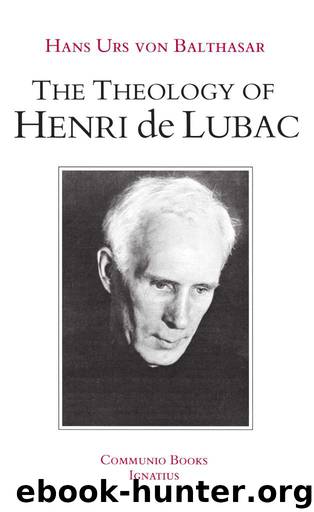Theology of Henri De Lubac (Communio Books) by Hans Urs von Balthasar

Author:Hans Urs von Balthasar [von Balthasar, Hans Urs]
Language: eng
Format: mobi
Tags: Spiritual & Religion
ISBN: 9781681495613
Publisher: Ignatius Press
Published: 1991-09-30T16:00:00+00:00
V
CREATURE AND PARADOX
While de Lubac, in the three areas of research we have described, made himself the defender of misunderstood and unappreciated themes and currents in the history of theology and presented his own thought only indirectly, this thought comes forth unconcealed in several shorter works of the middle period. In 1945, a small collection of Paradoxes was published, to which was added, in 1954, a second collection, Nouveaux paradoxes. Also in 1945 (with an imprimatur from 1941), De la connaissance de Dieu was published; augmented in 1948 after arousing senseless enmity, it was published in its final form in 1956 under the title Sur les chemins de Dieu. This form, with its many protective measures, made it somewhat less apt for its original purpose, which was to be a small handbook for modern intellectuals seeking God, since it had to be burdened with an abundance of patristic-scholastic annotations. The Paradoxes remained essentially undisturbed.1
We experience in these works more of the original point of departure for the author’s thought, although it was already sketched out, especially in Catholicisme and Surnaturel. This point of departure is certainly “Augustinian”, when one views Augustine as the “pinnacle of the patristic age”2 and the most important inspiration of the Middle Ages and even the modern period.3 But de Lubac—and this is part of his “Augustinianism”—is profoundly aware of the mortality of all historical systems of thought. The great minds leave their inscription upon the history of thought, but “as soon as their work is ‘surpassed’ it is also already misunderstood. Although we have their texts in our hands, we lack the imagination to reconstruct their mental universe. To do that we would have to rely on that which, in our very depths, has been newly recast.” With Augustine, we are hardly able to understand in our turn what he meant by “intelligentia fidei”—“the soul and moving force of all Augustinianism”. This mean between the supernatural “mystical illumination” of a holy soul and “rational elaboration by theologians or philosophers” no longer seems to be within our grasp.4 But the relationship of these two poles engages de Lubac’s interest constantly: the dynamism of the “restless heart” ineradicably present deep within,5 of that “habitual” longing for the absolute6 that “breathes” in the soul,7 preceding every act of thinking and willing,8 without, however, being an (“ontological”) vision of absolute being,9 but ever under the necessity of expressing itself in rational notions and concepts, conclusions, modes of proof, and systems, in order to make its antecedently given content clear to itself reflexively, although it can never exhaust or embrace this content in these unavoidable forms. One sees the proximity to Blondel and Marechal: “There is always more in the concept than the concept itself.”10 “We have a power of affirmation that surpasses both our power to conceive and our power to argue.”11 “Prior to all dialectic. . . our spirit already affirms God.”12 With Thomas: “In every act of thought and will, God is also thought and willed implicitly.”
Download
This site does not store any files on its server. We only index and link to content provided by other sites. Please contact the content providers to delete copyright contents if any and email us, we'll remove relevant links or contents immediately.
Resisting Happiness by Matthew Kelly(3337)
The Social Psychology of Inequality by Unknown(3018)
Day by Elie Wiesel(2781)
Designing Your Life by Bill Burnett(2740)
The Giving Tree by Shel Silverstein(2336)
Human Design by Chetan Parkyn(2068)
The Supreme Gift by Paulo Coelho(1962)
Angels of God: The Bible, the Church and the Heavenly Hosts by Mike Aquilina(1957)
Jesus of Nazareth by Joseph Ratzinger(1811)
Hostage to the Devil by Malachi Martin(1800)
Augustine: Conversions to Confessions by Robin Lane Fox(1769)
7 Secrets of Divine Mercy by Vinny Flynn(1741)
Dark Mysteries of the Vatican by H. Paul Jeffers(1707)
The Vatican Pimpernel by Brian Fleming(1699)
St. Thomas Aquinas by G. K. Chesterton(1632)
Saints & Angels by Doreen Virtue(1603)
The Ratline by Philippe Sands(1571)
My Daily Catholic Bible, NABRE by Thigpen Edited by Dr. Paul(1498)
Called to Life by Jacques Philippe(1475)
